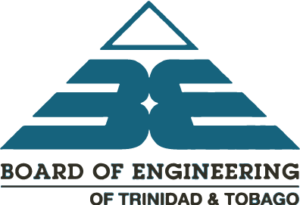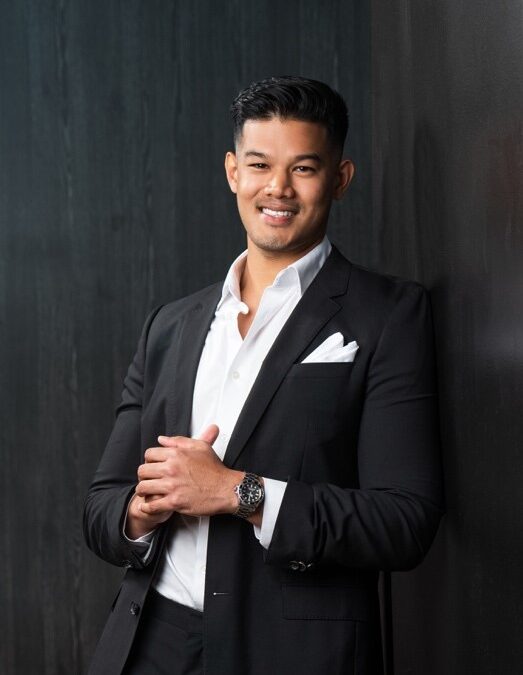Andrew Chin Lee, BSc Eng. | MSc. (Dist.) | A.M.ASCE | MAPETT | M.PMI | R. Eng.
A Chat with Engineer Andrew Chin Lee, one of the New Faces of Engineering in Trinidad and Tobago
Andrew, is a young engineer who exercised a sense of urgency in pursuing his professional Licensing. Obviously driven by a desire to be among the best in his industry, Andrew spared no effort in ensuring that he obtained maximum training and practical experience to meet the professional competency and proficiency requirements for Registration. As a young professional, his keen sense of the ethical responsibilities of the profession is indeed exemplary. Such foresight in pursuing Professional Registration at the earliest opportunity adds professional status and should be the ambition of every young engineer.
Q1. Andrew, congratulations on achieving your Professional Engineering Registration! Can you tell us in what area of practice are you registered and about your journey to becoming a Registered Engineer and what motivated you to pursue this milestone?
Thank you for the congratulations! I am proud to be registered as a Professional Engineer specializing in Project Management. My journey towards this milestone has been a fulfilling one, marked by years of dedication, hard work, and continuous learning. The journey began with my pursuit of a BSc. Civil Engineering (NY), where I gained foundational knowledge in the field and experienced modern construction and engineering practices. I furthered my studies with an MSc. Construction Management (TT) where I began to adore the dynamic of large scale construction – management of finances, accounts, and contractual agreements. Throughout my academic journey, I sought varying opportunities to gain practical experience and apply theoretical concepts in real-world scenarios. These experiences not only enriched my understanding of engineering principles but also provided valuable insights into the challenges and opportunities within the industry.
The culmination of my journey was achieving the rigorous practical training required validated my technical proficiency and commitment to upholding the highest standards of the engineering practiced. What motivated me to pursue this milestone was a deep-seated passion for problem-solving, innovation, and making a tangible impact on society through engineered solutions. Becoming a Registered Engineer was not just a personal achievement but a testament to my dedication to contribute meaningfully to the built environment and ensuring the safety, sustainability, and resilience of infrastructure projects.
Q2. How do you believe obtaining your professional engineering license will enhance your career prospects and impact your role in your field of practice?
Obtaining my professional engineering license represents a significant milestone in my career trajectory, with far-reaching implications for my professional growth and development. Beyond the immediate recognition of my expertise and dedication within the engineering community, licensure enhances my career prospects by opening doors to a myriad of opportunities for advancement, leadership, and specialization within my field of practice. The licensure process has equipped me with a comprehensive understanding of engineering principles, ethical considerations, and legal obligations, position in me as a trusted advisor and decision-maker in complex engineering projects. Moreover, it instils confidence in clients, employers, and stakeholders, assuring them of my competency, integrity, and commitment to delivering high-quality outcomes. As I navigate my career journey, I am confident that my professional engineering license will serve as a catalyst for continued growth, excellence, and impact in the dynamic and evolving field of Civil Engineering.
Q3. Can you discuss a specific project or experience from your engineering career that you believe exemplifies your readiness and competency as a professional engineer?
One project that vividly demonstrates my readiness and competency as a professional engineer was The Ministry of Health Administration Building on Queen’s Park East. This project tested my problem solving and management skills due to its demanding nature as well as I had taken up a role in the MEP team – a task unfamiliar to me at that time. As a member of the project team, I played a role in overseeing and assisting my superiors in managing responsibilities, such as project management, design implementation, procurement, and general stakeholder coordination. One notable aspect of this project was the installation of fire suppression and retention systems which I had no prior knowledge about, it really was a great learning experience in all disciplines of engineering. Each occurrence where I traverse the building, I reflect on my time and experiences learnt from that site as it emulates a sense of pride knowing that I contributed to its erection.
Q4. As a newly licensed engineer, what do you see as your primary responsibilities and obligations to uphold the standards and ethics of the engineering profession?
As a newly licensed engineer, I recognize the weight of the responsibilities and obligations that come with professional licensure. Foremost among these is the mandate to uphold the highest standards of ethics, integrity, and professionalism in all aspects of my work. I am committed to safeguarding the health, safety, and welfare of the public by adhering to relevant codes, regulations, and best practices in my engineering endeavours.
Additionally, I recognize the importance of maintaining competency through continuous learning, professional development, and staying abreast of emerging trends, technologies, and industry standards. This entails embracing a lifelong learning mindset, seeking opportunities for growth and improvement, and actively engaging in knowledge-sharing initiatives within the engineering community.
Furthermore, as a licensed engineer, I have a duty to act as a steward of the profession, advocating for sustainable and ethical practices, fostering diversity and inclusion, and promoting public awareness and understanding of the value of engineering. By embracing these responsibilities with diligence and dedication, I aim to uphold the integrity and reputation of the engineering profession and contribute positively to the betterment of society.
Q5. How do you plan to continue your professional development now that you have obtained your license? Are there any specific areas of specialization or skills you are interested in further developing?
Now that I have obtained my professional engineering license, I am committed to embarking on a journey of continuous professional development to further hone my skills, expand my knowledge base, and stay at the forefront of my field. My professional development plans encompass a multifaceted approach that encompasses formal education, specialized training and practical experience. Furthermore, I recognize the value of mentorship in nurturing talent, fostering professional growth, and imparting wisdom gained from seasoned practitioners. Therefore, I am eager to engage in mentorship programs, both as a mentee and a mentor, to cultivate meaningful connections, share insights, and contribute to the development of future generations of engineers.
Overall, my goal is to adopt a holistic approach to professional development that encompasses both technical mastery and soft skills development, enabling me to thrive in an ever-evolving and dynamic engineering environment.
Q6. How do you approach problem-solving and decision-making in your engineering work, and how do you believe your licensure will influence your approach to these aspects of your job?
In my engineering work, I approach problem-solving and decision-making with a methodical and analytical mindset, grounded in a deep understanding of engineering principles and best practices. My licensure reinforces my commitment to ensuring that my decisions are guided by sound engineering judgment, ethical considerations, and the best interests of all stakeholders involved.
When confronted with complex challenges or ambiguous situations, I rely on a systematic approach that involves thorough analysis, risk assessment, and collaboration with multidisciplinary teams. By leveraging diverse perspectives, soliciting input from subject matter experts, and considering alternative solutions, I strive to arrive at well-informed decisions that balance technical feasibility, economic viability, and environmental sustainability.
Moreover, my licensure empowers me to take ownership of my decisions and assume accountability for their outcomes, thereby instilling confidence in clients, colleagues, and stakeholders. By upholding the highest standards of professionalism and integrity in my problem-solving and decision-making processes, I aim to foster trust, promote collaboration, and drive positive outcomes in all my engineering endeavours.
Q7. Collaboration and teamwork are often essential in engineering projects. How do you effectively communicate and collaborate with colleagues, clients, and stakeholders to achieve project goals?
Effective communication and collaboration are foundational pillars of successful engineering projects, requiring proactive engagement, active listening, and clear articulation of ideas and expectations. I employ a multifaceted approach to communication and collaboration that encompasses both interpersonal skills and technological tools to facilitate seamless interaction and information exchange among team members, clients, and stakeholders.
One of my strategies for fostering effective communication and collaboration is establishing clear channels of communication and setting expectations early in the project lifecycle. This includes regular project meetings, status updates, and progress reports to ensure alignment on project objectives, milestones, and deliverables. Additionally, I leverage collaborative platforms and digital tools to streamline document sharing, task management, and virtual collaboration, especially in geographically dispersed teams.
Furthermore, I prioritize active listening and empathy, seeking to understand the perspectives, concerns, and priorities of all stakeholders involved. By cultivating an inclusive and participatory environment where diverse voices are heard and valued, I aim to harness the collective expertise and creativity of the team to achieve optimal project outcomes. Overall, effective communication and collaboration are central to my approach to project management and engineering practice, enabling me to build trust, foster teamwork, and deliver value to clients and stakeholders.
8. Finally, what do you hope to achieve or contribute to the engineering profession in the coming years, now that you have obtained your professional engineering license?
Looking ahead, my vision for the future involves making meaningful contributions to the engineering profession through innovation, leadership, and advocacy throughout the Caribbean. With my professional engineering license as a cornerstone of my expertise and credibility, I am poised to embark on a journey of continued growth, exploration, and impact in the dynamic and evolving field of not only civil engineering but infrastructural developments in our small island developing states.
One of my aspirations is to lead transformative projects that push the boundaries of innovation and sustainability as it applies to our region. Addressing pressing societal challenges such as climate change, urbanization, infrastructure resilience, and emerging housing crisis is a keen interest of mine. However, in this new generation of engineering I believe that leveraging applicable emerging technologies, interdisciplinary collaborations, and forward-thinking design principles can create enduring solutions that enhance quality of life, promote environmental stewardship, and foster economic prosperity for our communities.
As a future leader, I am committed to mentoring and empowering the next generation of engineers, sharing my knowledge, experiences, and insights to really bring forth change-makers in this profession. Whether through mentorship programs, guest lectures, or volunteer initiatives, I seek to nurture a culture of lifelong learning, curiosity, and excellence among aspiring engineers, equipping them with the skills and mindset needed to tackle the complex challenges of tomorrow.
In summary, my goal is to leave a lasting legacy in the engineering profession by pushing the boundaries of innovation, nurturing talent, and advocating for positive change. With my professional engineering license as a springboard, I am excited to embark on this life long journey of exploration, growth, and impact, contributing to the betterment of society and the advancement of engineering knowledge for years to come.


